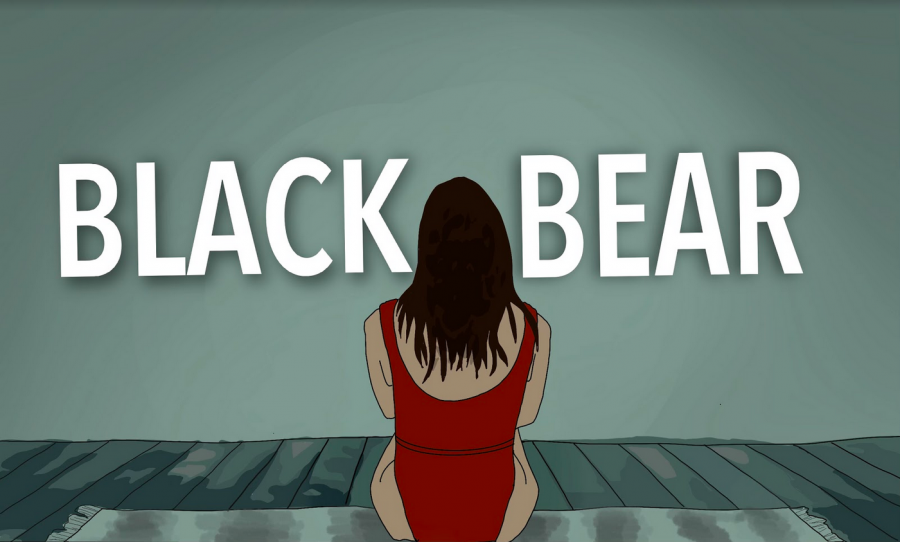“Black Bear”: Meta to a Fault
December 22, 2020
Rating: 3.5/5 falcons
We recommend reading this review after watching the movie, because it is better to go into the movie knowing little to nothing about it.
Black Bear is the new Art House movie starring Aubrey Plaza. It is either one of the best films this year, or just another self indulgent hipster movie, all depending on how you interpret it. The thing really wrong with the movie was its lack of closure. Unlike many other absurdist movies, the confusion felt throughout did not seem deserved. There was no big “aha” moment where everything came together and started making sense. There doesn’t need to be an explanation for every abstract theme, but without an explanation, a movie really needs to make you feel. If the movie had continued and let some of the ideas flesh out, maybe we would leave feeling satisfied. On the other hand, Black Bear does have a very unique premise and narrative structure, which makes it play a role in the advancement of independent cinema.
Black Bear was directed by Lawrence Michael Levine, who has written and directed other well liked indie movies. It premiered at Sundance at the beginning of 2020 on January 24th, but its online release was not until just a few weeks ago on December 4th.
This movie is divided into two narrative sections. The first part follows Allison (Aubrey Plaza) as she attends a retreat hosted by a pregnant woman named Blair (Sarah Gadon) and Blair’s boyfriend, Gabe (Christopher Abbott). The audience can already notice from their first interaction, that tension is boiling beneath the surface of this couple. This tension is further ignited by the flirtation between Gabe and Allison. That night, Blair walks in on Gabe cheating on her with Allison. This leads to an early narrative climax where the screen goes black and the second part begins. This section takes place in the same cabin in the woods, but instead of a retreat it is a film set. They seem to be filming what took place in the first piece but with Allison playing the cheated-on wife, and Blair playing the interloper. Gabe is the director who is married to Allison. He plays a Kubrick-like director who manipulates Allison into thinking she is being cheated on with Blair, to better her character in his film. But Blair and Gabe actually do end up being intimate, which Allison walks in on. This is when the second section ends.
One piece of Black Bear’s puzzle is the recurring symbols and motifs. One of the ongoing shots throughout is Allison sitting on the deck over the lake, she then walks back up to the cabin, where she writes in a notebook, this scene starts and ends each section. In both pieces the deck is where the husband and the interloper reveal their feelings for each other. It could be Allison surveying this as she sits staring into the lake. She could also be thinking all this up for the book she is writing. This scene is very open to interpretation.
Another recurring symbol comes in the shape of Black Bear’s titular animal, a black bear. As the characters learn more about the ugly truths, we see rustling trees and trash cans being knocked over, this shows the bear getting closer and closer, and the tension building. When the wife of each part finds out, that is when the bear appears. The bear in this film seems to be a physical embodiment of the inescapable nature of truth.
The best part of this movie, however, is undoubtedly Aubrey Plaza. I would recommend this film for her performance alone. She plays two very different roles in the two sections, but she creates such emotional complexity in both. The first portion is narratively focused on the couple, but the camera still follows her the whole time. Even without talking, her subtle reactions to the fighting, the way she seems to smile when tension builds, is enough for her to create a complex character around herself. Aubrey Plaza has always had the talent of acting a character that’s hard to read, and that talent is used perfectly in this role. You see the damage in her grow more and more as the story progresses. You can see the heartbreak in her eyes as her husband hugs her and tells her he loves her, and even though it’s a lie, she wants to believe it.
The overarching theme in this movie is the blurred line between art and life, and, despite this film’s faults, it successfully gets that idea across, albeit not very directly. We do believe because Hollywood is such a competitive industry we need to encourage more risky indie films over the more safe Oscar bait movies. That is why we rate this movie a 3 ½ out of 5 Falcons; it is flawed in its delivery of ideas and lack of point, but it pushes boundaries in terms of its format.
However, the flaws mentioned could be intentional. In the first part of the film Allison is having a conversation with Blair about her movies. She talks about how she doesn’t really have anything to say, and because of this Blair accuses her of being “sopalistic.” It’s possible that her calling Allison out for making futile movies is supposed to be a wink at the audience, saying, “I know this movie is pointless, but does art need to have a point?” Or, maybe like this movie, you shouldn’t read too much into it.









